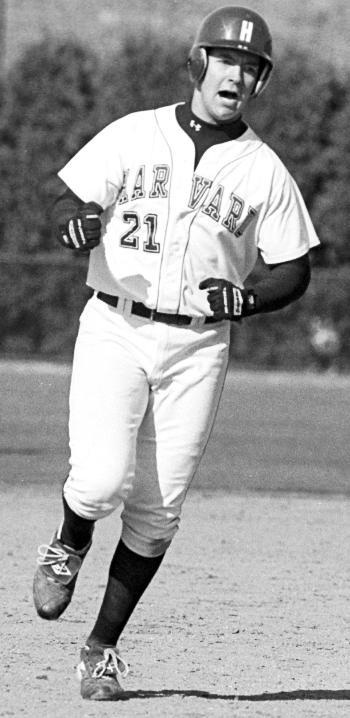
News
Cambridge Residents Slam Council Proposal to Delay Bike Lane Construction

News
‘Gender-Affirming Slay Fest’: Harvard College QSA Hosts Annual Queer Prom

News
‘Not Being Nerds’: Harvard Students Dance to Tinashe at Yardfest

News
Wrongful Death Trial Against CAMHS Employee Over 2015 Student Suicide To Begin Tuesday

News
Cornel West, Harvard Affiliates Call for University to Divest from ‘Israeli Apartheid’ at Rally
Saved By The Bell: Throwback Walsh Lives, Dies By Aggressive Style

Two weeks ago, the few Harvard fans who strolled past the football stadium over to O’Donnell Field to watch the baseball team’s home opener were hit by the melodious strains of War’s “Low Rider.”
Apparently, someone affiliated with the team had decided to use the public address system as many Major League ballparks do—not just for player announcements, but for personalized theme music. And so, the several dozen fans who showed up were treated to the jittery interplay of cowbell and bass as Harvard starter Justin Nyweide went through his warmups.
Later in the game, the crowd got to hear sophomore Mickey Kropf stride out to the plate to Johnny Cash’s “Folsom Prison Blues:” “I shot a man in Reno / Just to watch him die…” The moment was as surreal as any you’ll ever witness at the park.
The crowd went on to watch the Crimson lose in extra innings, which may partially explain why the musical experiment ended after one game. But the day the music died was probably the doing of Harvard Coach Joe Walsh, baseball purist.
Standing in the field with Walsh and hearing him talk about baseball, one can almost see the surroundings fade to a grainy black and white as he produces another screenplay-worthy yarn. And Walsh’s throwback nature is evident when he coaches. He lives on sacrifice bunts and hustle. He’ll call entire games from the dugout if he feels its necessary—although his two young catchers, Kropf and freshman Schuyler Mann, have done a capable enough job that Walsh usually feels content to let them run the show.
In this way, Walsh the baseball man can be a joy to watch—even though some of the decisions that stem from his throwback mentality might make an objective observer cringe.
Take his use of captain Ben Crockett, the Crimson’s ace and former Boston Red Sox draftee. Crockett threw 140 pitches against Brown Saturday, re-entering the game in the fifth and sixth innings in a game that the Crimson was losing by three runs. He had thrown 148 the previous week against Yale, and regularly throws over 120. And while Crockett was up to the task—he only seemed to get more dominant with each inning—one wonders if the decision to leave Crockett wasn’t a bit risky in the long term.
Did the coach know how many pitches Crockett had thrown? Walsh may be a throwback, but he’s no relic. He knew that senior Nick Carter had thrown 67 pitches by the fourth inning of his first career start a couple weeks back, and pulled him. Walsh is well aware of the pitch count—he has simply decided that Crockett, who only throws once a week, can battle through 120-plus pitches per start.
And Crockett is what Walsh would call a “Battler,” capital B, the best Harvard has. He held the Bears in check long enough to make a comeback possible, didn’t he? So, Walsh will leave him out there, risks be damned.
Walsh’s aggressive managing left an imprint on the Harvard scoring in that loss, as well. With two outs and the bases loaded in the bottom of the second inning, senior second baseman Faiz Shakir’s bloop double brought two runs home. Walsh, coaching third base, waved senior Javy Lopez around third, and Lopez was out easily at the plate.
Never mind that senior Mark Mager, generally one of the more reliable Crimson bats, was standing in the on-deck circle. You don’t get a lot of chances for a big inning in cavernous O’Donnell, just like you don’t get a lot of chances to break the Harvard strikeout record. Walsh sent Lopez, risks be damned. He’s done it with a lot of his baserunners, with varying degrees of success. But at any point of a given game, he’ll keep doing it.
Walsh will wave guys around third on the hope of bad throw. He’ll challenge a man trying to steal second—even with a speedster edging off third—just to make sure the play doesn’t go unchallenged. He’ll go on instinct, an instinct that has generally served him well as an Ivy League coach. Usually, it’ll work. Sometimes it won’t.
Come to O’Donnell Field today at noon. Come see a good baseball man and his team throw conventional wisdom to the winds from time to time, and continue to gut their way through the Ivy League season, perhaps to an Ivy League playoff date with Princeton.
Just don’t come for the fan-friendly music.
Want to keep up with breaking news? Subscribe to our email newsletter.
